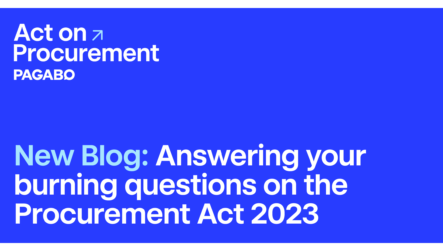Frameworks of the Future must be Flexible to Remain Effective and Compliant

In an industry so closely regulated as the public sector, frameworks are the simplest way to ensure reliable and compliant procurement – essential for adhering to changes to legislation as they come into force. Yet as more frameworks launch, scrutiny and legislation are growing tighter, with the incoming Procurement Bill moving the industry closer towards the goal of achieving the ‘gold standard’ set out in the Construction Playbook. Prioritising a flexible approach as a framework provider could hold the solution to serving the needs of a client, supplier and provider equally.

It was reported at the start of the year that 47,000 firms could be on the “edge of collapse”, with construction cited as one of the sectors most at risk, while recent ONS data showed that construction output overall fell by 0.9% at the start of 2024 – with infrastructure new work falling by 9.3%.
While the outlook may seem rocky, the need for public sector contracts will remain constant. Alongside core work like town planning and civil engineering, climate change means buildings need to be overhauled to cope with extreme weather. Meanwhile net zero targets are making decarbonisation another key focus – making frameworks an indispensable tool for both client and contractor.
To operate in this market, choice is key to ensure the right contractor is chosen for the right job – and that a healthy level of competition remains. Yet this must not come at the sacrifice of due diligence from the framework host or present the procurement officer with overwhelming choice paralysis.
What are Pagabo doing to offer flexibility?
To overcome this, we’ve created processes that give our frameworks a level of flexibility at numerous relevant touchpoints. This applies to simple factors, such as offering a variety of appointment options and contracts, such as Direct Award or New Engineering Contract (NEC), but applies across all touchpoints.
Thanks to this mindset, we were one of the first national framework providers to introduce the use of ‘core lists’ and reserve lists’ several years ago. We’ve seen first-hand the positive improvement they make on managing further competition, as well as mitigating any risks from market instability, should a supplier go into liquidation or new regulations come into force that make a client’s first choice now unviable.
We are committed to supporting the built environment sector and have developed our frameworks and processes specifically to facilitate this flexibility.
‘Bidder debriefs’, for example, give us a way to engage with every contractor bidding for a place on our frameworks – whether they’re successful or not. This process provides constructive and comprehensive feedback, which can strengthen their offering and, in turn, the sector as a whole. Similarly, reserve lists boost engagement and market brilliance, providing more businesses the chance to tender for career-changing work. And they provide even more opportunity for generating social value via successful and ethical procurement strategies.
Public sector procurement is only set to become more complex as concerns such as safety, security, quality and value for money remain front of mind for every project – and as a general election looms. The framework market is strong, but to make the right decisions it will pay to dig deeper and search for a provider offering the level of flexibility required to meet the demands of the modern world.
Discover more information on our range of frameworks today.
Discover our frameworks































